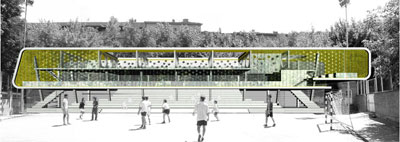
Recent art projects employing locative media and "radical cartogoraphy" have helped us consider the ways in which maps, city plans, and roads function as vehicles for ideology. They are technologies, in their own way: systems designed to facilitate the transmission of messages, the flow of goods and services, and the formation of real-life social networks. The School of Missing Studies (SMS) has formed their own "network for experimental study of cities marked by or currently undergoing abrupt transition." The group is led by Katherine Carl and Srdjan Jovanovic Weiss, two artists and academics currently based in the United States, but working primarily in Eastern Europe, along with a large group of active collaborators. Their projects tend to linger, going through new iterations as they move nomadically from venue to venue, taking on a site-specific element as they are shaped by the perspectives of local participants. For their Manhattan Shadow Project, a group of citydwellers with diverse backgrounds gathered with architects, artists, and writers from New York and Belgrade to create "a database of occurrences of Manhattan shadows--physical, metaphorical, and digital." Their explorations delved into the tools that have been used to draw lines in cities--from stenographic chalk borders to skyscrapers' ghostly silhouettes--and the social implications of these new forms of organization and building. Perhaps SMS's best-known project, the Lost Highway Expedition is a resuscitation of the unfinished 'Highway of Brotherhood and Unity' in the former Yugoslavia, a throughway constructed by volunteers of the republic, in the 1960s, to connect its major cities and cultures: Ljubljana, Zagreb, Beograd, and Skopje. SMS moved through these towns and other smaller ones along the way, working to initiate new art projects, ideas, and cross-cultural collaboration. The fruits of this work have been presented in shows, symposia, and a publication entitled Europe Lost and Found. Their newest effort--Stadium Culture--is similar in its rethinking of retired political initiatives designed to artificially stimulate cultural experience. Instead of retracing the course of past endeavors, Stadium Culture proposes to, "create an identity that engages some positive elements of the socialist past while defining urban future on some new terms". Working in collaboration with the Normal Architecture Office, and on commission from kuda.org, the Novi Sad-based Center for New Media, the group is working to build a stadium that becomes a focal point for "the difference between the two central agents for youth activity: sports and electronic media, lingering at loose ends in today's transitional society." This major undertaking is one which draws parallels between the state of public space in Novi Sad and the state of political participation by its youth, based on its historical social initiatives and current unique socio-political situation in relation to the European Union. By holding spaces up as a lens, in this way, the School of Missing Studies makes transparent otherwise invisible discourses about the lives of individuals in often overlooked places. - Marisa Olson
Image: Architectural Proposal for "Stadium Culture", Novi Sad